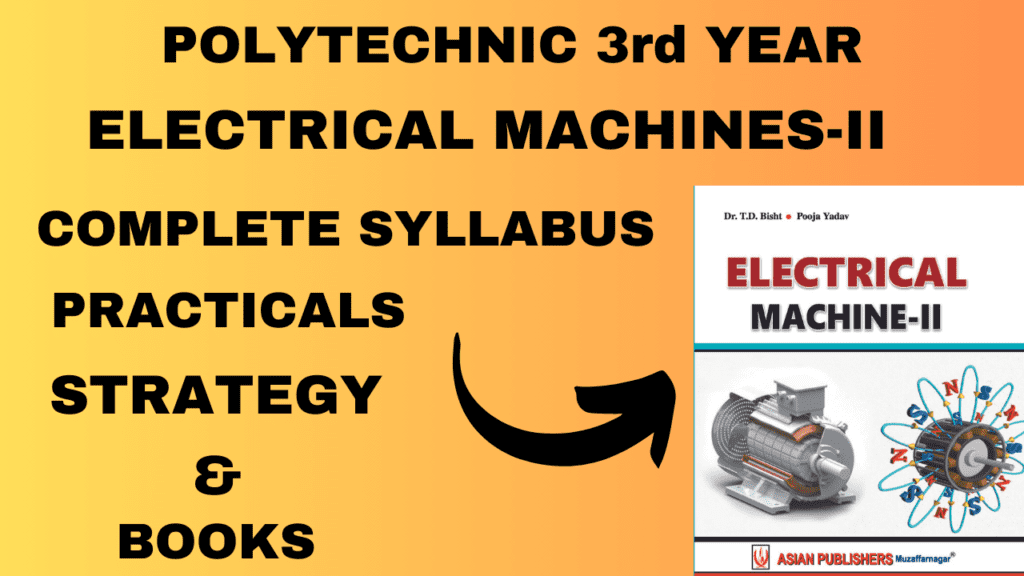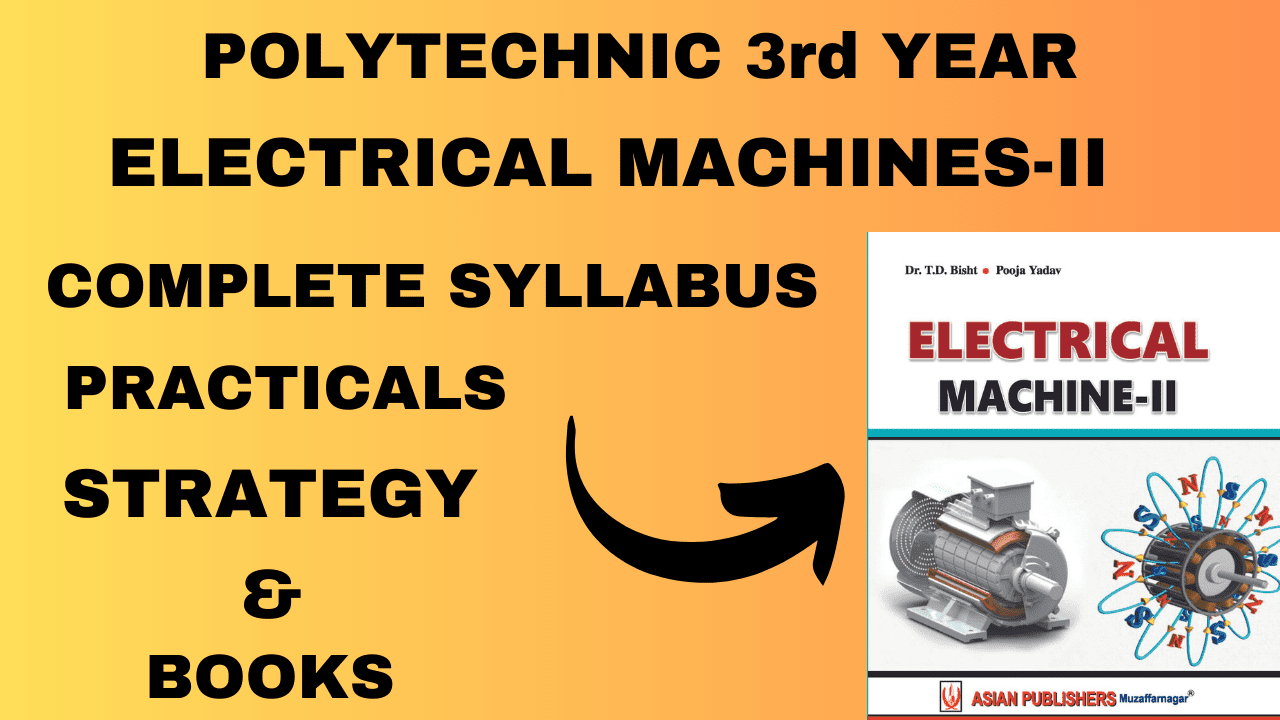Dear students, if you are a student of Polytechnic Third Year Fifth Semester of Electrical & Electronics Engineering and you want to know what are the units in Electrical Machines II, then you have reached the right place. In today’s post, we read detail about the Electrical Machines II which is approved by BTEUP and this is the Electrical Machines II new syllabus.
So let’s start the post and read about Electrical Machines II detailed syllabus. Electrical Machines II Subject is common subject in Polytechnic Branch.

DETAILED CONTENTS OF POLYTECHNIC FIFTH SEMESTER ELECTRICAL MACHINES II FOR ELECTRICAL & ELECTRONICS ENGINEERING
1.) 3 Phase Induction Motors
1.1) Production of rotating magnetic field in 3 phase winding.
1.2) Salient constructional features of squirrel cage and slip ring 3-phase induction motors.
1.3) Principle od operation, slip and its significance
1.4) Locking of rotor and stator fields
1.5) Rotor resistance, inductance, emf and current
1.6) Relationship between rotor copper losses, slip and rotor input power.
1.7) Power flow diagram of an induction motor
1.8) Factors Determining the torque
1.9) Torque-slip curve, stable and unstable zones.
1.10) Effect of rotor resistance upon the torque slip curve
1.11) Double cage rotor motor and its applications
1.12) Starting of 3-phase induction motors, DOL, star-delta, auto transformer starter.
1.13) Causes of low power factor of induction motors
1.14) Testing of 3-phase motor on no load and blocked rotor test and to find efficiency
1.15) Method of Speed control of induction motor
1.16) Harmonics and its effects, cogging and crawling in Induction Motors.
1.17) Specifications and ratings of induction motors.
2.) Single Phase Motors
2.1) Single phase induction motors; Construction characteristics, specifications and
applications.
2.2) Nature of field produced in single phase induction motor-double revolving field theory.
2.3) Split phase induction motor
2.3.1) Capacitor start, capacitor run, capacitor start and run motor
2.3.2) Shaded pole motor
2.4) Alternating current series motor and universal motors, construction,working
principle and operation, application.
2.5) Single phase synchronous motor
2.5.1) Reluctance motor
2.5.2) Hysteresis motor
3.) Synchronous Machines
3.1 Main constructional features of synchronous machine including commutator and brushless excitation system
3.2 Generation of three phase emf
3.3 Concept of distribution factor and coil span factor and emf equationArmature reaction at unity, lag and lead power factor
3.4 Equivalent circuit diagram of synchronous machine
3.5 Concept of voltage regulation. Determination of voltage regulation by synchronous impedance method.
3.6 Operation of single synchronous machine independently supplying a load.
3.7 Concept of infinite bus bar. Need and necessary conditions of parallel operation of alternators, synchronizing an alternator (Synchroscope method) with the bus bars
3.8 Operation of synchronous machine as a motor –its starting methods
3.9 Effect of change in excitation of a synchronous motor, V curve, Concept of synchronous condenser.
3.10 Concept and cause of hunting and its prevention
3.11 Specification, rating and cooling of synchronous machines.
3.12) Applications of synchronous machines
4.) Special Purpose Machines
Construction, working principle and application of linear induction motor, stepper motor, AC Servomotor, Submersible Motor.
LEARNING OUTCOMES
After studying Electrical Machines II subject, students will able to:
- Demonstrate the constructional features of a synchronous machine and its working as a
synchronous motor - Operate the synchronous motor as synchronous condenser
- Use 3-phase induction motor in the industry for various operations
- Operate and maintain three phase squirrel cage and three phase slip ring induction motors.
- Start and reverse the direction of rotation of three phase induction motors using different
types of starters. - Conduct speed control of three phase induction motor.
- Operate and maintain double cage induction motors.
- Recognize the condition of cogging and crawling in three phase induction motors.
- Operate different types of single phase induction motors.
- Operate different types of special purpose motors
LIST OF PRACTICALS
- Determination of efficiency by (a) no load test and blocked rotor test on an induction motor
(b) direct loading of an induction motor (refer BIS code) - Determination of effect of rotor resistance on torque speed curve of an induction motor
Observe the performance of a ceiling fan (I-Phase) induction motor) without capacitor - Determine the effect of change in capacitor on the performance of 1-phase induction motor and reverse the direction of motor.
- To plot relationship between no load terminal voltage and excitation current in a synchronous generator at constant speed
- Determination of the relationship between the voltage and load current of an alternator,
keeping excitation and speed constant - Determination of the regulation and efficiency of alternator from the open circuit and short circuit test
- Determination of the effect of variation of excitation on performance of a synchronous motor
INSTRUCTIONAL STRATEGY
Teacher should lay-emphasis on development of understanding amongst students about basic
principles of operation and control of electrical machines. This may be achieved by conducting quiz
tests and by giving home assignments. The teachers should also conduct laboratories classes
themselves encouraging each should to perform with his/her own hands and draw conclusions.
RECOMMENDED BOOKS
- Electrical Machines by SK Bhattacharya; Tata McGraw Hill, New Delhi
- Electrical Machine by B.L.Thareja; S.ChandPublicaion, New Delhi
- Electrical Machines by SK Sahdev; Uneek Publications, Jalandhar
- Electrical Machines by Nagrath and Kothari; Tata McGraw Hill, New Delhi
- Electrical Engineering by JB Gupta; SK Kataria and sons, New Delhi
- Electrical Machines by Samarjit Ghosh; Pearson Education (Singapore) Pvt, Ltd. Delhi
- e-books/e-tools/relevant software to be used as recommended by AICTE/UBTE/NITTTR, Chandigarh.
Download Electrical Machines II Syllabus click here
Download Microprocessors And Peripheral Devices Syllabus click here
Download Industrial Management And Entrepreneurship Development Syllabus click here
Download Energy Conservation Syllabus click here
Dear Students, please comment your suggestion and for any other subject’s BOOK, notes and syllabus PDF, leave a comment and tell us how you liked this article.
To read more article like this, bookmark website booksandsolutions.in
Thank you for giving us your most valuable time.
